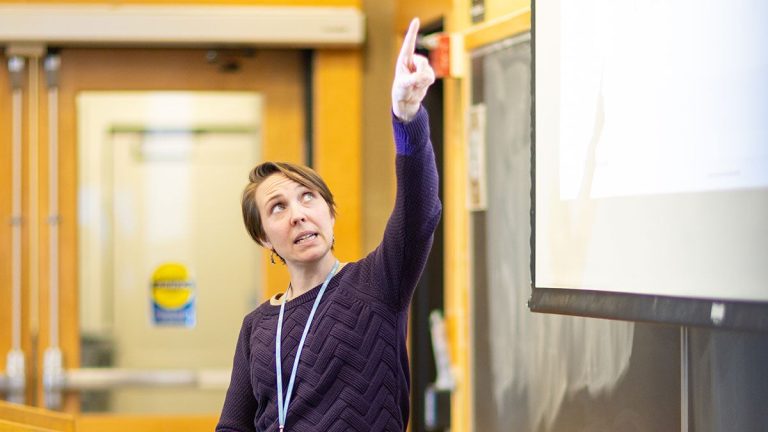A focus on research and teaching
A highly selective program, IRACDA at Tufts only accepts three applicants per year. Researchers who join the program are matched, based on their interests, with academic mentors who are seeking postdoctoral support in their laboratories.
For the first year of their four years with IRACDA, researchers are funded by their mentors; for the next three years, an NIH grant covers their salaries – at a competitive rate based in Boston – and provides additional financial support for laboratory supplies and travel to conferences. Over the four years, researchers spend approximately 75 percent of their time working in their mentors’ laboratories; the remainder is dedicated to teaching and other career development activities, such as workshops, practical interviews, research presentation opportunities, conferences in specific fields, and an annual national conference that brings together researchers of IRACDA from all over the country.
“The combination of cutting-edge research and professional development opportunities has made IRACDA invaluable to me,” says Lauren Crowean alumna of the Tufts program who now teaches in the Department of Biology in the School of Arts and Sciences at Tufts. “The ability to balance lab work with meaningful career preparation prepared me for success in a way that a traditional postdoc could not.”
Biology professor Katie Mattaini (center) guides her students through a lab on Nov. 20, 2024. Mattaini was part of Tufts’ IRACDA program. Photo: Anna Miller
Katie Mattainiwho entered the Tufts IRACDA program a year before Crowe and now also teaches in the Tufts biology department, agrees. “The chance to be the instructor of record while I was in a postdoctoral position, for a course that I had developed myself, was an incredible experience,” she says. “It gave me the confidence and skills I needed to pursue a career focused on teaching.”
Partnership for Inclusive Science
In addition to preparing participating researchers for successful careers in research and teaching, Tufts’ IRACDA program has another goal, the biology professor says. Mitch McVeywho co-directs Tufts IRACDA with Moore. “One of our missions is to promote diversity in all its forms in biomedical sciences,” he explains. “We do this in part by partnering with minority-serving institutions, where our scholars gain teaching experience. »
The partner institutions – Bunker Hill Community College, UMass Boston and Suffolk University – each serve underrepresented student populations in the sciences. Plus, they offer a wide range of classroom contexts and student needs, says Jordan Wilkinson, senior research administrator at Tufts’ IRACDA program.
For example, at UMASS Boston, IRACDA works with both the Biology Department and the Honors College. This means that Tufts IRACDA researchers have the choice of teaching, say, a traditional introductory biology course with 300 students or a specialized honors course that they developed themselves for just 15 or 20 students. According to Wilkinson, this choice allows them to personalize their postgraduate education experience based on the type of training they are interested in and the type of institution they eventually wish to join.
Researchers aren’t the only ones who benefit from educational partnerships, Moore points out. “Academics typically bring something new to the departments where they teach, whether it is expertise in a field or a teaching innovation. They also often mentor the students they teach, both in terms of research and career prospects, which gives them great added value.
A community of collaboration and support
Beyond the teaching experience IRACDA postdocs gain and the research they are able to conduct, researchers benefit from the program’s unique focus on community, McVey says. Unlike traditional postdocs, who often lack structured peer networks, IRACDA researchers enter a cohort.
“Normally for postdocs there is no community,” McVey says. “Within IRACDA, they benefit from a very supportive community, which often remains in place well beyond their participation in the program. »
This was the case with Sanchez. She joined IRACDA at the height of the COVID-19 pandemic. The community she found among her academic colleagues – both at Tufts and in IRACDA programs nationwide – served as a lifeline. “Even though everything was on Zoom,” she says, “I had a support system. We helped each other navigate the challenges of remote teaching and research, and that hasn’t changed post-pandemic.
Mattaini and Crowe had similar experiences. “You come in with a community of like-minded people and passions within academia,” Mattaini says. “You learn about each other’s research, discuss things like classroom management or new teaching methods, and help each other apply for jobs. »
“And the community extends beyond Tufts,” adds Crowe. “Every year at the national conference, it was exciting to interact with IRACDA postdocs from across the country, learning about what they were doing in their teaching and research and how they were mentoring students from undergraduate in their laboratories.
Sanchez maintains the spirit of community even now that she has landed a position as an assistant professor at Framingham State University. She meets monthly with one of the mentors who guided her through her journey in the IRACDA program, receiving support to navigate the challenges of starting a new academic job. At the same time, she participates in workshops, alumni socials, and hands-on teaching sessions with current researchers whenever she can.


